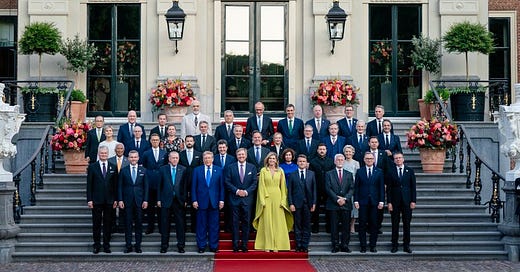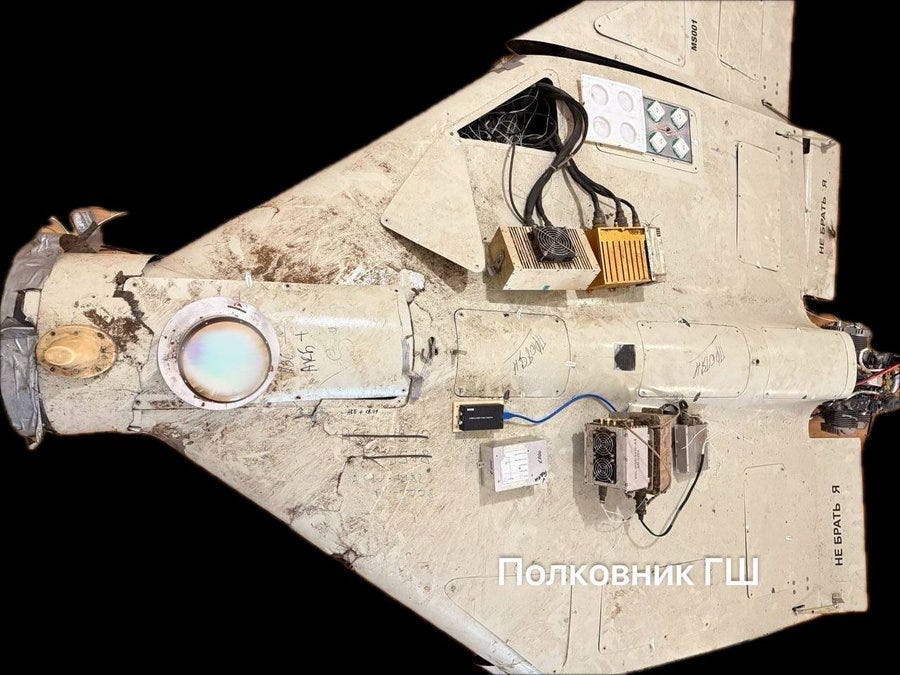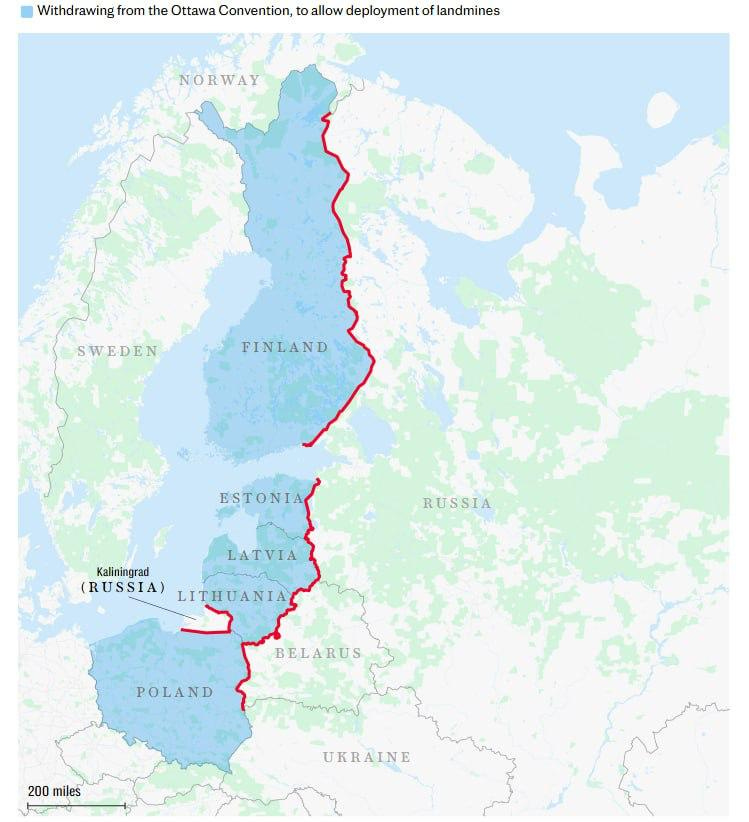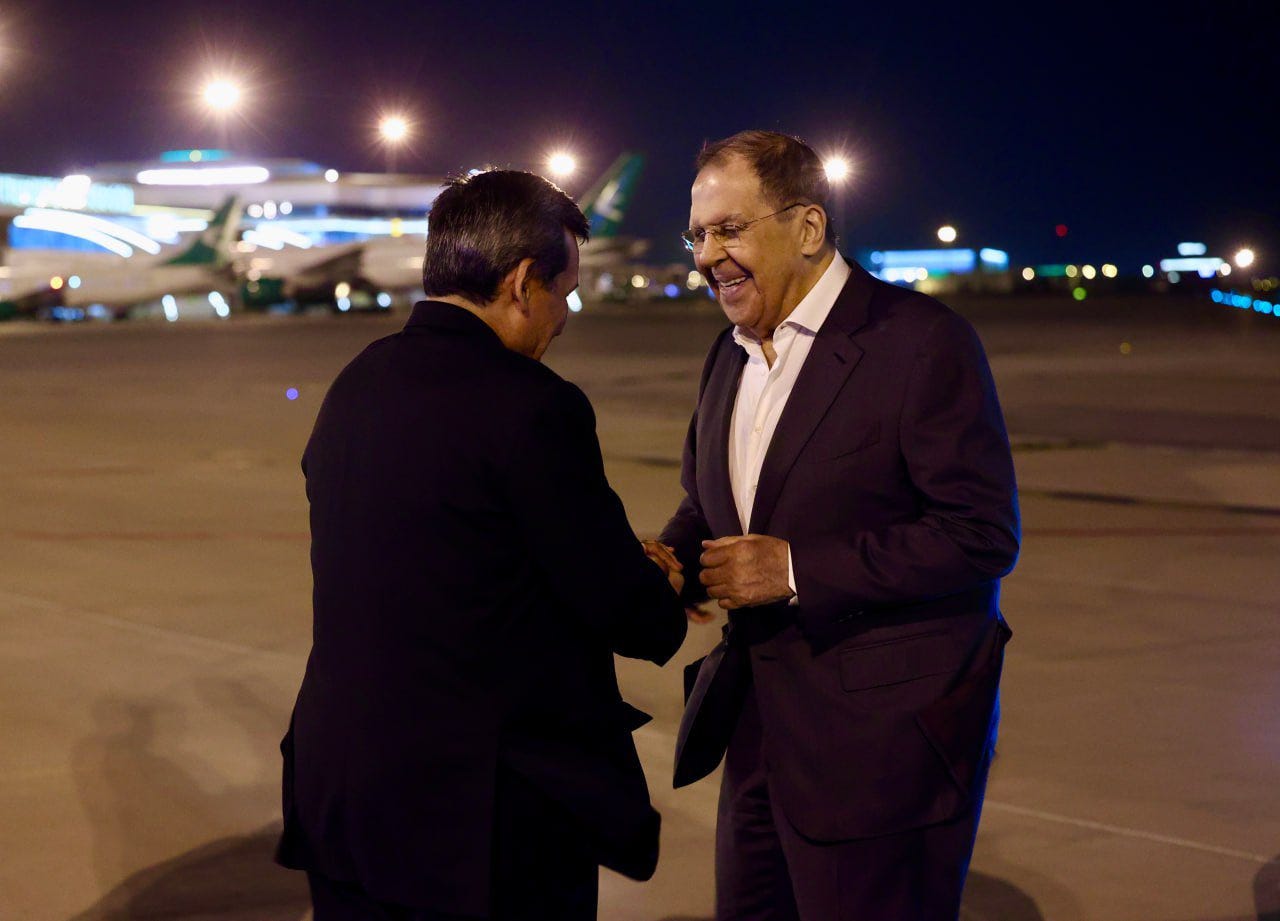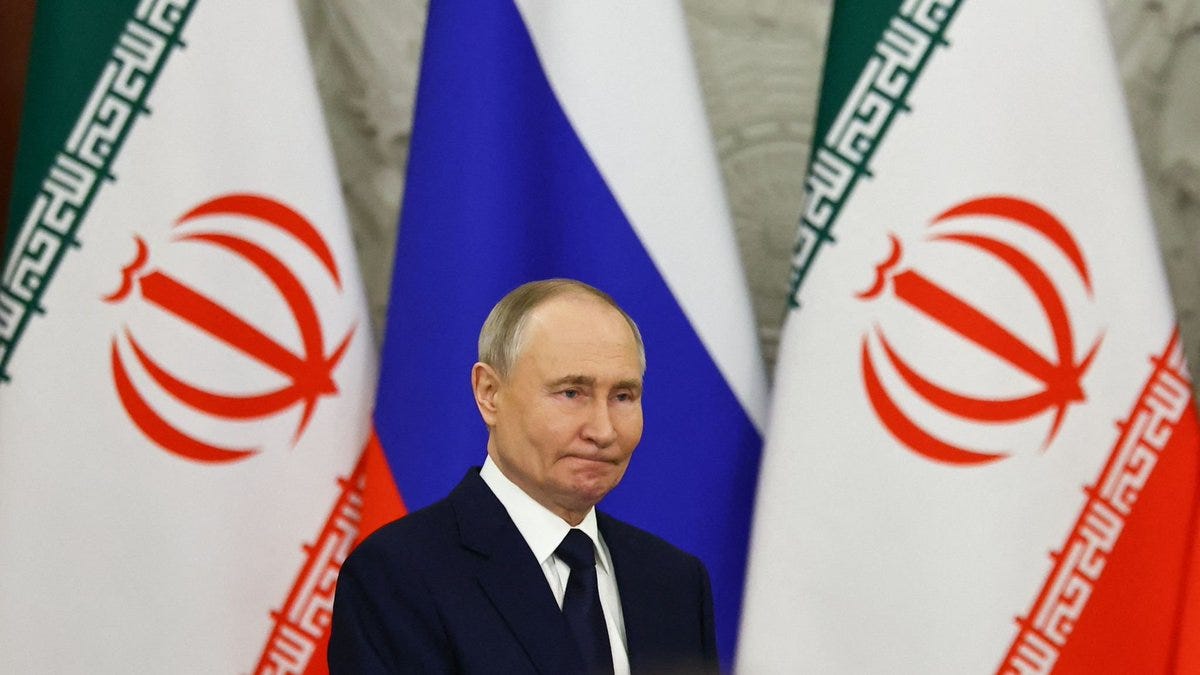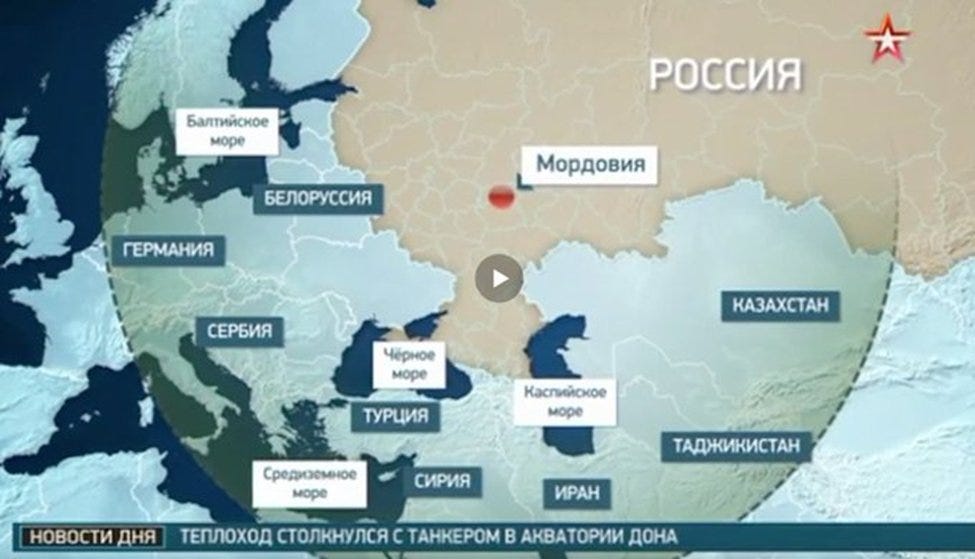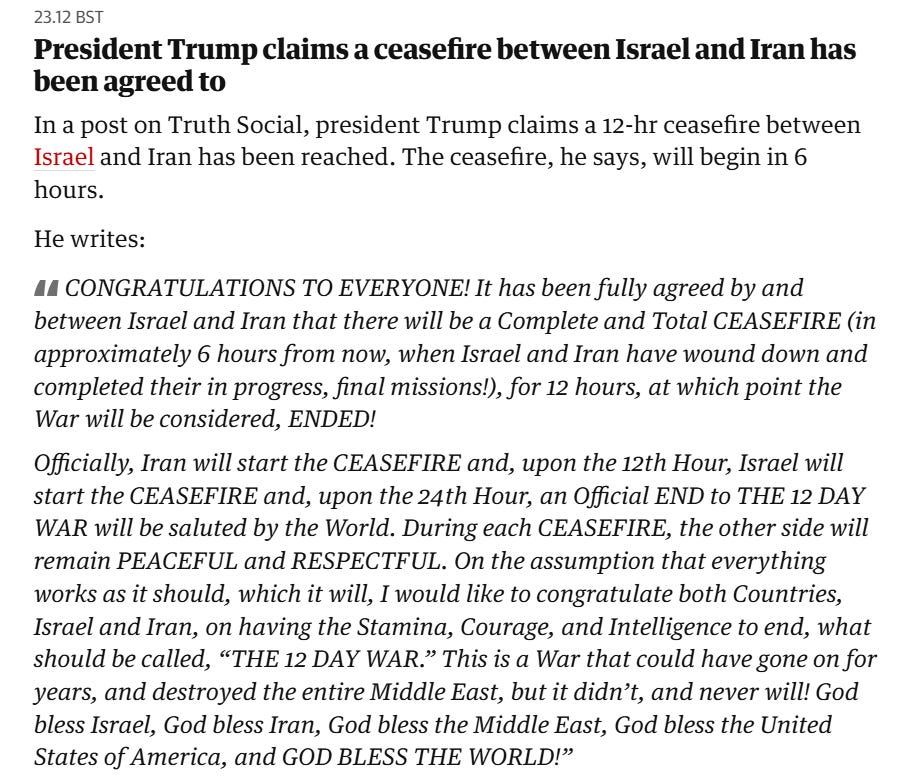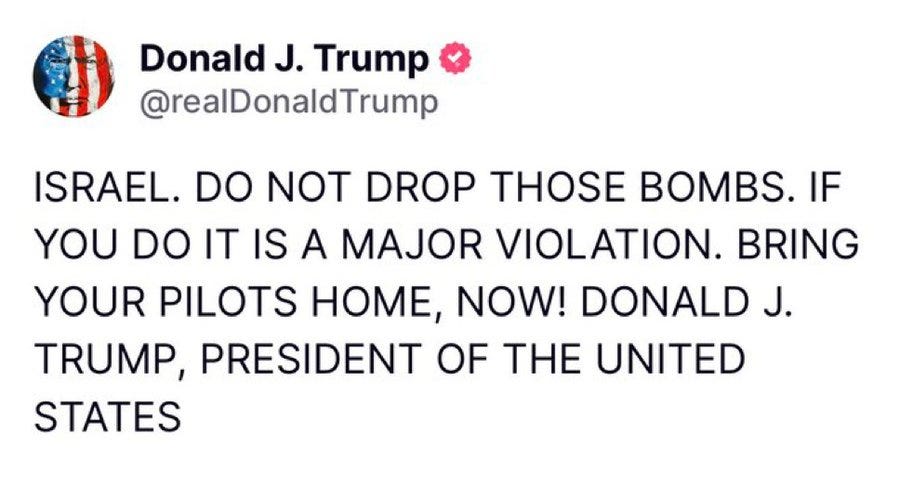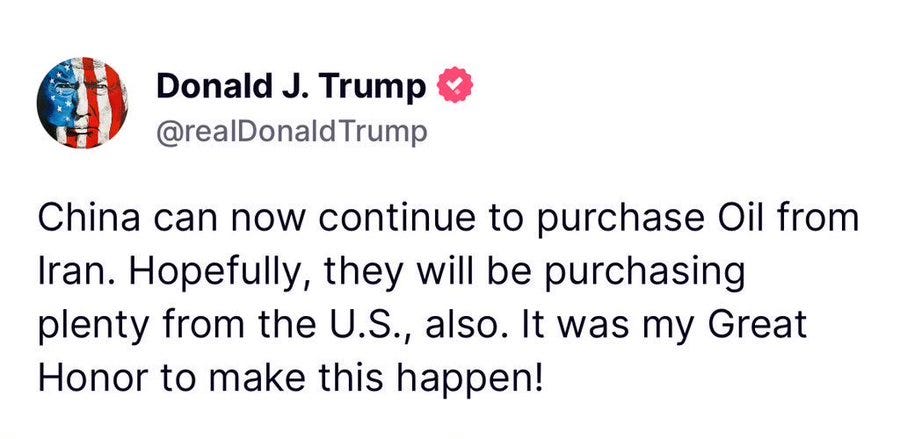June 25: E-Stories
InUkraine CombatSitRep BehindLines Russia-China InEurope InTheUS InOtherNews NATOSummit Israel-Iran-Trump
Catching up…
For a general view of news from various geopolitical threatres, Scott’s EA Worldview is always superb.
“Ukraine will never accept Russian ultimatums. From day one, even without partner support, we’ve shown we are not an object, we are a subject. I believe we won’t be a bargaining chip in deals between great powers.”—Zelensky on Sky News
Stories we’re following…
Russian attacks on Sumy Oblast kill 3 people, including 8-year-old boy. Russian forces launched a drone attack on Sumy Oblast overnight on June 24, killing three people, including an 8-year-old boy, and six more injured, among them 3 children. Around 30 homes damaged, Governor Oleh Hryhorov reported.
2 killed, 12 injured in Russian missile strike on Odesa Oblast. The attack targeted a local educational institution and destroyed the building, Odesa Oblast Governor Oleh Kiper said.
Maria Avdeeva: Russia hit Dnipro with ballistic missiles in broad daylight today. Odesa–Zaporizhzhia train badly damaged, passengers injured. While the world watches the Middle East, the frontline creeps closer to Ukraine’s major cities.
17 people murdered. Over 279 injured in Dnipro, including 19 children. 5 carriages were destroyed.
A Russian missile hit near a passenger train, shards of glass everywhere inside the carriage. The station is a scene of chaos. People are being treated right where they fell as train #52 from Odesa to Zaporizhzhia took a direct hit.
Russia ordered 2 assassination attempts on popular journalist Dmytro Gordon, Ukraine security service says. Dmytro Gordon, a prominent Ukrainian journalist and YouTube host with 4.5 million subscribers, is known for his sharp criticism of Russian aggression.
In Brussels on July 1st, the premiere of the documentary "Prisoners: The System of Terror", produced by the Activatica media project, exposing the brutal system of repression built by Russia in the occupied territories of Ukraine.
"Prisoners: The System of Terror" explores how Russia has built and expanded a hidden apparatus of terror in the occupied Ukrainian territories. The film reveals the chilling journey of abducted civilians – beatings, torture, isolation, fabricated charges, and indefinite detention in secret prisons.
This system is not new. Its roots trace back to the Soviet era, took shape during the wars in Chechnya, and is now being implemented in Ukraine. It is a meticulously constructed apparatus of repression that exists alongside the official justice system, yet operates entirely outside the law. The exact number of detained civilians remains unknown, but estimates range from 7,000 to 30,000.
Following the film screening, we invite you to stay for a discussion with:
Oleksandr Tarasov, Ukrainian human rights activist and former civilian prisoner
Tetyana Omelianenko, mother of Ukrainian prisoner Domian Omelianenko and founder of NGO Liberta
Evgeniya Chirikova, human rights defender and coordinator of Activatica
Combat Situation
ISW: Russian forces conducted a large-scale combined drone and missile strike against Ukraine on the night of June 22 to 23 that largely targeted Kyiv City and killed at least seven people and injured 28.
Ukrainian forces advanced in northern Sumy Oblast. Russian forces advanced near Kupyansk, Borova, Pokrovsk, and Novopavlivka and in Sumy Oblast.
Ukraine strikes Atlas oil depot in Russia's Rostov Oblast, General Staff says. The facility supplies fuel and lubricants to Russian military units.
Sentinel-2 L2A images show the aftermath of recent drone attacks on Russia's Kristall oil depot near Engels-2 airbase in Saratov region. Four fuel tanks are completely destroyed, and another four were likely damaged significantly.
On Tuesday afternoon, Ukrainian drones are striking targets in Russia’s territory — in North Ossetia, Dagestan, the Republic of Tatarstan, and the Bashkortostan region.
An overnight missile strike hit the base of Russian naval special forces “Española” in Chornomorske, occupied Crimea. Russian sources claim there were no casualties thanks to “advance warning” and evacuation.
NATO believes Russia has hit its peak in armored vehicle output — now producing around 130 tanks monthly, most of them old models restored or upgraded. Despite reaching this ceiling, Russia can reportedly sustain this pace for at least another year.
Russia is now using a new Iranian Shahed-136 variant in Ukraine, marked “MS”. It’s a step up from the older models, with upgraded satellite navigation and a camera connected to an Nvidia Jetson module for visual target tracking. The engine and warhead appear unchanged. There are signs Iran is sending these fully assembled drones to Russia in exchange for other weapons.
Behind the Lines
ISW: Russian occupation administrators attended the St. Petersburg International Economic Forum (SPIEF) to secure additional investment and development opportunities for the occupied regions of Ukraine.
Russia’s investment in occupied Ukraine is driven by two predominant factors: first, the desire to reap economic benefit from the occupation, and second, to further integrate occupied Ukraine into the Russian sphere of influence using economic levers.
Russian occupation officials continue to advertise the deportation of Ukrainian children to summer camps in Russia.
Russia is expanding its infrastructure for the forced removal and militarization of Ukrainian children in occupied Crimea and is opening a new children’s camp on the premises of the sanctioned “Artek” international children’s center.
Russian occupation authorities continue to target religious minority communities in occupied Ukraine.
Zelensky, Starmer hail 'massive step forward' in military cooperation. During a joint visit to a U.K. military training site for Ukrainian personnel, Prime Minister Keir Starmer said he and Zelensky held "an excellent bilateral meeting" and had agreed to an "industrial military co-production agreement."
Zelensky at the NATO Summit: Ukraine’s defense industry can produce $44B worth of arms yearly. Nearly 1,000 types from artillery to advanced drones and missiles. But 40 percent of this capacity lacks funding. Zelensky: "We can make 8M drones a year, but funding covers far fewer."
Poland and Ukraine plan to create a cross-border military drone manufacturing valley Located between the borders od this two countries
Ukraine and Denmark signed a deal to launch joint weapons production. Denmark pledged €67M to start Ukrainian defense manufacturing on its soil — the first step of the Build with Ukraine initiative.
NATO Allies Plan to Lay Mines Along Russian Border — A New Iron Curtain Rises According to The Telegraph, these countries are Finland, Estonia, Latvia, Lithuania, and Poland. All of them have already announced plans to withdraw from the Ottawa Convention, which bans the use of anti-personnel landmines.
Aerospace giant Airbus to train Ukrainian specialists in aircraft maintenance. As part of the deal, Airbus will send representatives to Ukraine to train local specialists, who will then become certified instructors for aircraft maintenance.
Christiane Amanpour: “Just sat down with Canada’s PM Mark J Carney at the NATO summit. He tells me Iran’s missile launch at US bases last night “was proportionate, it was de-escalatory… [and] it gives an opening for diplomacy.”
Serbia halts all arms exports amid Russian scrutiny over Ukraine. Serbian President Aleksandar Vucic said on June 23 that Serbia has halted all arms exports, denying that the move was in response to Russian criticism over munitions reportedly reaching Ukraine.
The Insider: Armenia cuts re-export of Russian gold exposed by The Insider’s investigation, bilateral trade down $3B in 2025
Armenia has significantly reduced its re-export of Russian gold — a trade previously detailed by The Insider in a November 2024 investigation — contributing to a $3 billion decline in bilateral trade with Russia since the beginning of this year. According to Russian Deputy Prime Minister Alexei Overchuk, who spoke with the business publication Vedomosti, “the overall annual decline will evidently total $6 billion.”
Overchuk blamed the development on Armenia’s increasingly close ties with the European Union, claiming the diplomatic shift is “already having a colossal negative economic impact” on Yerevan’s relations with Moscow. He warned that Russian businesspeople are becoming increasingly cautious about doing business with Armenia. He also argued that the Eurasian Economic Union (EAEU) and the European Union are “incompatible,” asserting that Brussels “will not allow Yerevan to maintain normal relations with Russia.”
Dangerous: As per Reuters and the Financial Times, the custodians of trillions of dollars of global central bank reserves are eyeing a move away from the greenback into gold, the euro and China's yuan as the splintering of world trade and geopolitical upheaval spark a rethink of financial flows. (Mo: we’ll address this trend in future E-Stories posts as the narrative in and of itself is quite dangerous for the world’s economic stability.)
Meanwhile in Russia & China…
Oil prices fell sharply in evening trading on Monday after Iran fired missiles at US bases in Qatar and Kuwait in retaliation for strikes on its nuclear facilities. By 9:58 p.m. Moscow time, Brent crude futures had fallen 7.3% to $71.36 a barrel. WTI contracts fell 7.4% to below $70 for the first time since the Israeli strikes on Iranian territory, trading at $68.42 a barrel.
Russia's FM Sergey Lavrov was in Turkmenistan on an official visit. He was greeted by Deputy Chairman of the Cabinet of Ministers and FM of Turkmenistan Rashid Meredov on the tarmac. While Lavrov was visiting in Turkmenistan, Secretary of State Marco Rubio called FM Rashid Meredov about the Israel-Iran conflict.
Dara Massicot: For the second time, Russia finds itself with few military options to support a critical partner in the Middle East. This thread explains Russia’s military options and limitations for supporting Iran before, during, and after this conflict.
Note: this thread doesn't delve into the political balancing Russia engages in across the Middle East, which informs their choices. Here, I address Russian military and defense base capacity and how it shapes options.
I didn't expect the Russian military to intervene last minute to head off IDF operations – there was no viable “dash to Tehran” type of scenario here for Russia. And, the cooperation treaty between Russia and Iran has no mutual defense clause.
Russia had options to support Iran with military equipment during a building crisis for months BEFORE the IDF operation began: delivery of extra air defense systems or modified Shaheds, accelerated delivery of fighter aircraft to Iran if needed, but it's not so simple.
Why? Russian SAM systems are heavily committed to the war in Ukraine and now guard critical infrastructure and airbases across Russia. Yet, could Russia have spared a token battery/battalion for Iran in the last few months? Yes. Did they? don't think so.
It’s not easy for Sukhoi to surge additional delivery of fighter aircraft in production for Iran - particularly for the Su-35 they purchased, making that option unlikely.
Russian production of Shahed/Geran drones has accelerated, and it produces by some estimates between 1-2 thousand a month. Some could have been sent to Iran **and may still be sent to Iran or proxies** at the cost of availability to nightly strikes against Ukraine.
VKS tactical aviation is not fully engaged in Ukraine although parts exhibit signs of stress on crews and airframes ( Su-25s, A-50s). Could they have deployed a squadron or smaller? Yes, technically, with a huge amount of risk.
The VKS has experience deploying to Iran; it occasionally used the Hamadan/Nojeh airbase to deploy to Syria starting in 2015. But unlike Syria, the mission of any hypothetical VKS deployment to Iran would be complicating IDF air/missile strikes, which the VKS can't do well.
For starters, the VKS could not enforce any no-fly zone before the conflict in Iran and certainly cannot do so now. It would take too many aircraft, and Russia’s airborne sensors (A-50) are stressed due to Ukraine operations and losses.
Secondly, while VKS tactical aviation may train for aerial refueling (needed to maintain any type of constant air presence for CAP/NFZ), they haven't done it in Syria or Ukraine and couldn’t surge that capacity now for Iran when they have no control over the air space.
The VKS operates this way since they don't have a large tanker fleet. They use frequent sorties, short of their full combat radius. This is a limit that impacts longer flight times or pursuing fleeting or dynamic targets (see this report for more).
When the VKS operated in Syria, it couldn’t prevent coalition forces from operating. They would often sortie and intercept coalition air forces operating in areas they didn’t like, and at times engaged in dangerous and unprofessional activity.
But now Operation Rising Lion has been underway for one week. The IDF has disabled large parts of Iran’s Air Force, air defenses, military leadership, and C2. The IDF controls large parts of Iranian airspace. Russia is unlikely to send the VKS into such an environment.
While the VKS would be outclassed in technical capabilities by the IDF, and the United States and Israel have the sensors in place to track the airspace and movements, that was mostly true in Syria. A big limiting factor is logistics.
Logistics for any Russian military presence or deployment of weapons would likely come from ports in the Caspian. Could Russia put deliveries on its navy ships to ‘shield’ them from attacks as they did in Syria? They could, technically. With risk.
The IDF is experienced at targeting Russian-origin weapons cargo once it is offloaded in Mediterranean ports (consistently without killing Russians), regardless of whether it came off a Russian Navy ship or commercial vessel.
Bottom line: while the IDF operation is underway, I think it would be a major departure for how the Russian military has been used in the past to try to force in the VKS or deploy air defense systems. This is not a “dash to Pristina” or “dash to Damascus” environment.
The Kremlin might feel differently about this if there is a concerted effort at regime change, but they would still face these constraints, and would have to contend with IDF operating in the airspace (at a minimum).
Most likely Russian activities that threaten US assets and Israel: Russia has a large production capacity of Geran/Shaheds and could attempt to supply them by offloading them from Navy ships in the Caspian, or get them to Iranian proxies.
The DPRK has offered to send assistance to Iran, and Russia could certainly facilitate that transit via rail in Russia/neighboring countries, or via the sea in the Caspian, although at risk of it being intercepted pier-side by IDF strikes.
Russia could provide targeting support and advanced ASCMs to the Houthis to be a menace to IDF Navy or US/NATO ships in the Gulf of Aden and Red Sea.
It’s too soon to consider what things look like for Iran after this IDF operation concludes, but the Russian defense industrial base will be first in line to try to sell equipment to them, whether Tehran wants or needs it, I leave it to the Iran experts.
Russia has many other intelligence or active measures it can use to support Iran, and it’s not always visible, as Nicole Grajewski said, it is not so simplistic as to say that Russia has completely abandoned Iran in its time of need.
Russia has several ground-based warning radars that if it chose to, it could, in principle, provide Iran with some sort of situational awareness of air traffic– such as the Kontayner over-the-horizon radar system.
I would think that drones are the most plentiful option that Russia could supply to Iran, who in turn could pass them to their proxies to target Israeli and American facilities.
The Kremlin is not in a military alliance with Iran. However, Russia not taking any steps to send aid before this conflict began, or during, may raise questions about their reliability as a partner, and not just for Iran. They may try to increase efforts when the dust settles.
Perhaps Iran didn't request aid from Russia in the first place - i defer to Iran watchers on that point. But in the end, what I see are again the limitations of Russian expeditionary power in the middle east, and the cost of the war in Ukraine.
PS Never thought we’d see a day when Rusich, a Russian neo-Nazi mercenary group, is praising the Israelis while condemning the Russian Air Force, and making some very valid points about Russian airpower while they are at it. Odd timeline we are on.
Reuters: China's auto industry has inflated car sales for years through a burgeoning government-backed grey market that registers new cars right off the assembly line and then ships them overseas as "used" vehicles.
These so-called "zero-mileage" cars have never been driven, but they are being exported as used to markets like Russia, Central Asia and the Middle East, allowing Chinese automakers to show growth and to dispose of cars that would be difficult to sell domestically, according to a Reuters review of government documents and interviews with five auto dealers and car traders.
The export and sale of fake used cars is actively encouraged by regional governments in China, according to a Reuters review of state media reports and government documents. Local governments have embraced the practice as vital to meeting ambitious targets for economic growth set by Beijing, according to a Reuters review of local policy documents and state media articles.
The zero-mileage used car export market works like this: as a fresh car emerges from the assembly line, an exporter buys the car either directly from the automaker or from a dealer, registers it with a Chinese license plate, and then immediately marks it as a second-hand car for shipping abroad. Along the way, the automaker books the car as sold and logs the revenue.
The tactic is only one sign that China's car industry – the world's largest – is allowing production to outpace demand, driving a protracted domestic price war and spurring accusations of automotive "dumping" abroad.
Mo: in other words, the Chinese government is registering ONE car TWO TIMES and it distorts what the real economy is. Chinese stats for the car market show double what the real numbers are, and it affects calculations regarding the GDP of local provinces and population.
In Europe…
The NATO Summit kicked off with the Public Forum: distinguished leaders and guests from the national security sector held informal talks on the issues that will be discussed in the coming hours.
Mark Rutte: “There is an ancient Roman saying, if you want peace, prepare for war. It’s a simple idea, make your defences so strong that no one dares to attack you.
Today, NATO’s military edge is being aggressively challenged by rapidly rearming Russia, backed by Chinese technology and armed with Iranian and North Korean weapons. We need to unite, innovate and deliver and that’s exactly what this forum is all about.
We need to do more. We need to do it better and together, and we need to do it now.
It is simply unthinkable that Russia, with an economy 25 times smaller than Nato’s, should be able to outproduce and outgun us.
We must spend more to prevent war. We must win this new war of production. That’s what this summit is all about.
Rutte added that Russia shows no interest in peace and should face stricter sanctions. He urges EU allies to back the 18th package to “hit the shadow fleet that Putin is using to finance his war machine" and says he "remains confident" that U.S. will follow suit
Chancellor Merz at NATO summit: “For far too long, we in Germany didn’t want to hear our Baltic neighbours’ warnings about Russia’s imperialist policies. We have recognised this mistake – and there is no going back from this realisation.”
The Netherland's King Willem Alexander and Queen Maxima hosted NATO members for dinner before the start of the summit.
EU Commission president Ursula von der Leyen: “We are integrating our defence industries as if Ukraine was in the EU. This is good for Ukraine. And just as good for Europe, as Ukraine is now home to extraordinary innovation.”
Von der Leyen assures Zelensky that the block's 18th sanctions package on Russia "is the biting one, it's a hard one" "... You're here among friends" von der Leyen reassures Zelensky.
In the Dutch parliament, Zelensky called for total isolation of Russia: 18th sanctions package, $30 oil price cap, blocking its tanker fleet and cutting it off from the banking system. He stressed Ukraine must not be left alone and urged long-term defense programs and higher European military spending. MPs welcomed him with applause.
The Netherlands steps up: PM Schoof says NATO will soon unveil a major support package for Ukraine, focused on drones and air defense. Meanwhile Dutch acting Defense Minister Brekelmans confirms a new €175M military aid package, including drones and radar systems, on top of €500M already committed for 600,000 UAVs, NOS reports.
Donald Trump releases a private message sent by NATO Sec General Mark Rutte - with a very big claim, and written, it would seem, in the most Trumpian language (NATO has confirmed to BBC it is genuine).
Trump, en route to NATO summit, was just asked if he's committed to Article 5
"Depends on your definition... [there are] numerous definitions of Article 5, you know that, right?", he said.
"But I am committed to being their friends... You know, I've become friends with many of those leaders and I'm committed to helping them."
"I'm committed to saving lives... I'm going to give you the exact definition when I get there [to the summit]."
His most senior diplomat at Nato, Matthew Whittaker, insisted “The United States isn’t going anywhere”, after Nato’s Rutte also said that allies should “stop worrying so much” about the US and focus on investing more money.
Czech Republic’s Pavel says one of the big questions facing Europe is “for how long the US will be able to maintain the same level of engagement in Europe,” adding “this is the area which we will have to discuss with our American allies.” He explains Europe needs to find out
“what is the pace of disengagement, if any, and we should plan it properly, in a good coordination.
We shouldn’t allow the situation that the United States are frustrated by lack of response from European allies to push us over the cliff, and by doing that, we have to embed building our own enablers into our defence planning that will be then reflected in our national budgets, and we have to do it in good coordination, because no single European country can build such a capacity on its own.”
The Nato summit was hit by major train disruption in the Netherlands, with the government, and the police saying it could have been a deliberate act of sabotage.
Denmark's PM Frederiksen was just asked about Trump’s claims to Greenland.
"Of course, the future of Greenland has to be decided in Greenland and nowhere else,” she said.
“I am really transatlantic in my heart, and I will do almost anything and everything to ensure that NATO is still the most important alliance in the future. So I’m not going to say anything against the US, and you will never find me in that position.
We have a disagreement about Greenland. For now, I think the President is serious about this question, and so are we, because I think all of us have to respect the sovereignty of the Kingdom of Denmark"
Slovakia signals conditional support for the EU’s 18th sanctions package against Russia—just hours after Hungary said both countries opposed it. FM Blanar: “If it doesn’t harm our economy, we’re ready to back it.”
Fearing war with Russia, Finland hardens NATO’s northern frontier. Since the invasion of Ukraine prompted Helsinki to join NATO two years ago, tensions reminiscent of the Cold War have resurfaced along the forested 1,340-km frontier, Europe’s longest with Russia.
The Nordic nation is beefing up an already-sizeable reservist force and will host a new command for NATO, whose members meet in the Hague on June 24 for an annual summit.
Still under construction, an imposing barbed-wire-topped fence now dominates a once-bustling section of the border, closed by Finland after it accused Russia of weaponising migration. Shopping malls and restaurants that buzzed with Russian visitors have fallen quiet. [continue reading]
More political repression in Georgia. E-Stories has featured stories reporting on the repressive measures that have been passed by the Georgian Dream-led government leading up to the October 2024 election and afterwards. However, the government has increased their repressive measures against activists and opposition politicians purposefully and significantly.
Giorgi Kandelaki: Regardless of their political biographies and tastes, they are all pro-American and pro-Western, while the regime jailing them (and two more political leaders last week) is openly backed by the Kremlin, cozying up to both China and Iran's ayatollah regime. This in itself presents a profound geopolitical dimension of the matter.
On Tuesday, “Strategy Aghmashenebeli” leader Giorgi Vashadze was arrested. Police arrived at his party office, formally presented charges, handcuffed him, and placed him in a vehicle.
The Insider: Kremlin bot network 'Matryoshka' attacks EU summit in Moldova, creating fake videos allegedly on behalf of The Insider and other media
The Kremlin disinformation network "Matryoshka" continues its campaign against Moldovan President Maia Sandu and is timed to coincide with the EU summit in Moldova, which is scheduled to take place in Chisinau on July 4. The "Bot Blocker" project ( antibot4navalny ) told The Insider about this.
One of the videos distributed as part of the campaign pretends to be content from The Insider. It says in English that the Vice President of the European Commission Kaja Kallas refused to go to Chisinau because of a conflict with Maia Sandu and the fear of losing her post because of her. The video also mentions the Bot Blocker project, which allegedly found out that Sandu was spreading fake information discrediting Kallas (which is obviously not true).
The campaign spreading information about the fictitious conflict between Sandu and Kallas and the former’s plans to become the vice-president of the European Commission became known back in late May. Bots began sending out fake videos disguised as products of major European publications on June 19. At that time, analysts from the Bot Blocker project assumed that the campaign was timed to coincide with the Moldova-EU summit scheduled for July 4. As Radio Liberty wrote, European officials consider the meeting in Moldova a kind of political recognition of Sandu’s reform efforts and a gesture of support ahead of the parliamentary elections in Moldova on September 28, especially important at a time when the ratings of her party (Party of Action and Solidarity, PAS) are falling.
In the US…
WaPo: The Supreme Court allowed Trump to deport migrants to “third countries.” Yesterday’s ruling cleared the way, for now, for Trump to deport immigrants to countries where they are not citizens. It drew a fiery dissent from liberal justices.
Fed Chair Jerome Powell just said that the Fed would have cut interest rates if not for Trump’s tariffs. Trump’s tariffs are to blame for rising costs.
In other news…
NYT: Strike Set Back Iran’s Nuclear Program by Only a Few Months, U.S. Report Says. The attack sealed off the entrances to two nuclear facilities but did not collapse their underground buildings, classified findings indicated. The report suggests that President Trump’s earlier statement on the strike’s success was overstated.
RIA Novosti reports that Iran has not yet received ceasefire proposals and intends to fight until long-term peace is achieved, CNN reports , citing an unnamed senior Iranian official.
"Iran has not received any ceasefire proposals and sees no reason for such a proposal... Iran will continue to fight until long-term peace is achieved," the channel said in a statement.
The official added that Iran would perceive any statements from Israel or the United States as a "deception" aimed at justifying attacks against Tehran's interests , the TV channel reports.
The IDF confirms another airstrike wave in western Iran: fighter jets hit underground IRGC facilities used for storing and launching missiles. Earlier today, a launcher targeting Israeli aircraft was also destroyed.
Israel conducted one of the biggest air strike campaigns thus far. The agreed-to ceasefire is scheduled to take effect in a matter of hours. The objective may be to completely decapitate the Islamist regime and encourage a popular uprising.
Israel aims to end its campaign in Iran by week’s end, Kan 11 reports. A senior security official: “The coming days will be powerful to persuade Iran to stop. If not—we go full force.”
The Israeli military issues new evacuation orders for additional areas in Iran’s capital, Tehran. More and extensive airstrikes are expected in the coming hours.
Reuters: Israeli Defence Minister Israel Katz ordered the military to strike Tehran in response to what he said were missiles fired by Iran in a violation of the ceasefire announced hours earlier by Trump.
Two air-defense radars were reportedly destroyed in Iraq tonight. First at Al-Taji base near Baghdad, second at Imam Ali Air Base in Dhi Qar. Iraqi channels suggest Israeli involvement.
Iranian missile strikes in Israel this morning. Iran launched multiple missile waves, with a deadly strike in Beersheba killing three, Reuters reports. Iranian media claims the ceasefire began after four attack waves. Tehran had warned it would halt strikes if Israel stopped by 4 a.m.
Iran confirms the death of Basij Intelligence Protection Commander Mohammad Taghi Yousefvand in an Israeli missile strike on Tehran, according to the IRGC’s Lorestan unit. Another high-ranking casualty.
CNN: Trump rebukes Israel as his Middle East truce appears to falter
President Trump flashed intense anger this morning as the ceasefire he brokered between Israel and Iran appeared to grow more fragile. Trump was critical of both sides, but reserved his harshest condemnation for Israel, who he said “unloaded” on Iran “as soon as we made the deal.”
“We have two countries that have been fighting for so hard and so long they don’t know what the f--- they are doing,” a furious Trump said of Israel and Iran, each of which he accused of violating the truce he announced the night earlier.
ISW: There appear to be internal fissures within the Iranian regime over how to respond to the conflict with the United States and Israel. Unspecified Iranian leaders have reportedly developed a contingency plan to govern Iran without Khamenei in the event that Khamenei is killed or informally sidelined.
Former Israeli DM Avigdor Lieberman slams the ceasefire with Iran: “A painful, bitter conclusion. Instead of unconditional surrender, the world enters tough negotiations—while Iran keeps enriching uranium, building missiles, and funding terror. Nothing has changed.”
Iranian President Masoud Pezeshkian: “A ceasefire has begun. The war forced on our people by the Zionist entity’s adventurism has ended. The enemy started it, but our nation’s will decided how it ends. The world saw Iran’s strength and unity — and the heavy toll on the aggressor, despite their censorship.”
Iran’s Supreme National Security Council statement on the ceasefire: “The unique awareness, solidarity, resistance, and unity of the people shattered the enemy’s core strategy, empowering the resilience and remarkable strength of the warriors of Islam.”
Declaring victory without winning a war—Iran has claimed victory over Israel: thousands celebrate in the streets. Iran’s National Security Council claims it forced Israel to back down and stop its aggression. Massive festivities kicked off in the capital.
I wonder what he’s getting from China. It was obvious that the Strait of Hormuz could not be closed by the Iranians because the Chinese would not allow anything to happen to considerable volume of Chinese exports and imports that transit the Strait. Taiwan should take note of the US administration’s position.

